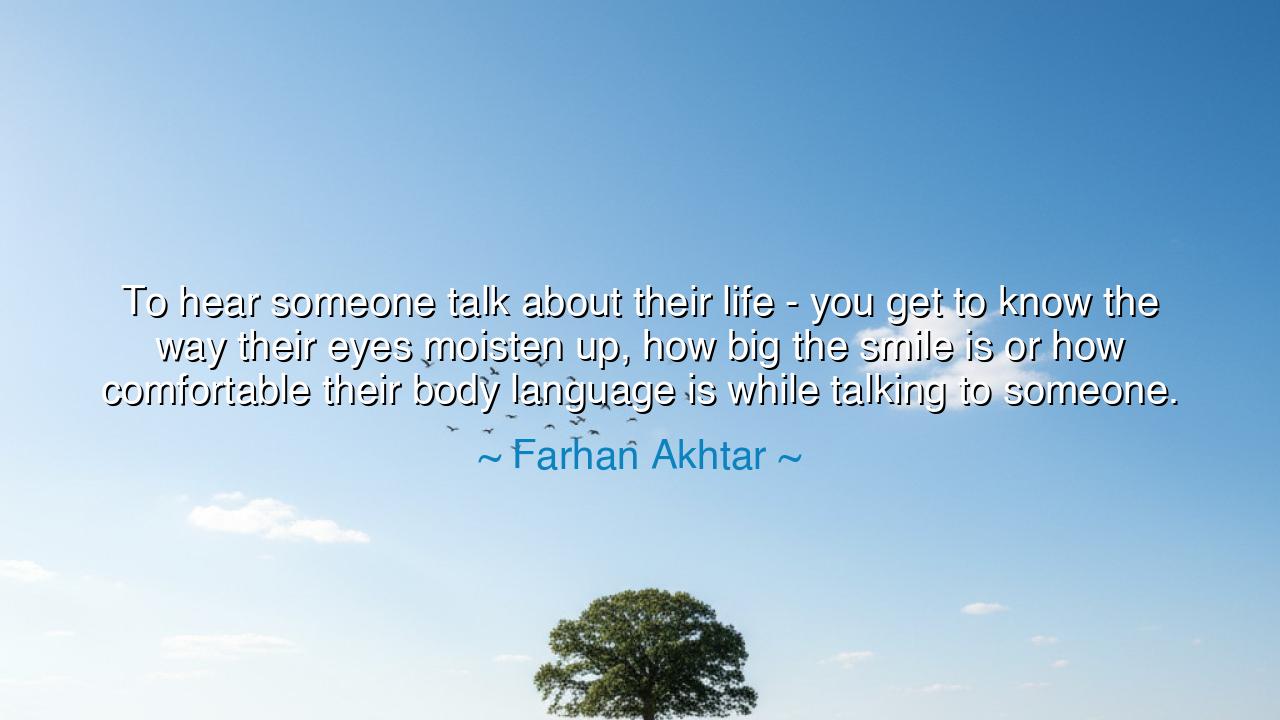
To hear someone talk about their life - you get to know the way
To hear someone talk about their life - you get to know the way their eyes moisten up, how big the smile is or how comfortable their body language is while talking to someone.






Hear the words of Farhan Akhtar, poet of film and voice of truth, who declared: “To hear someone talk about their life—you get to know the way their eyes moisten up, how big the smile is or how comfortable their body language is while talking to someone.” This saying, tender and observant, teaches us that the essence of a human being is not captured only in words, but in the tremors of emotion that accompany them. For the body, the eyes, the smile, and the posture are not ornaments to speech, but the deeper language of the soul.
When a person speaks of their life, they are not merely narrating events as in a chronicle. They are unveiling themselves. The eyes betray what words conceal—whether pride, sorrow, longing, or joy. The smile, radiant or fleeting, reveals the heart’s warmth. The body language, whether open or guarded, declares what trust or fear lingers within. Thus Akhtar reminds us: to truly listen is not only to hear with the ears, but to behold with the heart, to pay attention to the whole being before us.
The ancients spoke often of this art of listening. Confucius taught that to know a man, one must observe not only his speech but the manner in which he carries himself. The Greeks believed that truth could be seen in the eyes—the “mirror of the soul.” The Stoics observed posture and bearing as signs of a person’s mastery over themselves. Akhtar, in modern tongue, carries forward this ancient wisdom: that true knowledge of others is gained not only through their stories, but through the subtle signs that rise unbidden as they tell them.
Consider the example of Abraham Lincoln, who was renowned for his ability to understand men. It was said that he could sit silently as another spoke, studying the twitch of a lip, the hesitation of a hand, the glimmer in the eyes, and from these draw deeper conclusions than from the words themselves. This gift of observation gave him power not only as a statesman but as a healer of divisions, for he saw through pretenses to the living heart beneath. Akhtar’s words remind us that this gift is not for the great alone, but for all who would live in compassion.
The smile here holds special power. When one speaks of their past or their dreams, and the smile grows wide, it is a sign of life’s sweetness, of memories cherished or hopes alive. Yet when the eyes moisten as they speak, it is a sign of wounds not yet healed, of grief that still breathes. To witness both—the tears and the smile—is to witness the fullness of another soul. And it is in such witnessing that bonds are formed, for people long not to be impressed, but to be understood.
From this teaching flows a greater lesson: that listening is itself an act of love. To give attention to another’s body language, their smile, their tears, is to say: “You matter. I see you. I receive you as you are.” In a world filled with noise, such listening is rare, and therefore sacred. It is the soil in which trust grows, the ground where peace is born, the space where humanity reveals its truest self.
Therefore, O seeker, take this lesson into your own life: when you meet another, do not only wait for your turn to speak. Listen with your whole being. Watch the eyes, honor the smile, notice the trembling of the hands or the shifting of the body. Let your listening be more than hearing; let it be the act of beholding the other as a living soul. In doing so, you will not only learn their story, but share in their truth.
Thus Farhan Akhtar’s words, spoken as an artist of the present, echo like the counsel of sages of the past: to truly know others, attend not only to their words, but to the light in their eyes, the curve of their smile, and the movements of their very being. For these reveal the heart more fully than speech, and in such seeing, we draw nearer not only to one another, but to the essence of life itself.






AAdministratorAdministrator
Welcome, honored guests. Please leave a comment, we will respond soon